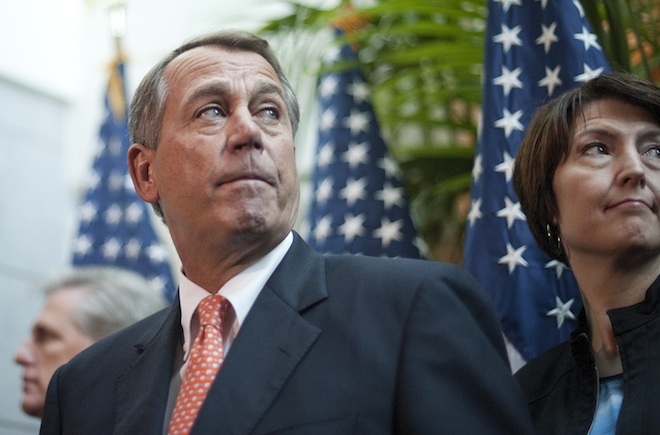The fight over renewing the payroll tax cut into next year has escalated into a multi-front political war, both between Republicans and Democrats, and within the Republican party itself.
But lost in the gamesmanship and the arguments about process, hypocrisy, and leadership are the issues at stake.
So let’s review.
This debate started earlier this year when President Obama introduced his jobs bill, the priciest provisions of which were a one year renewal (and broadening of) this year’s payroll tax holiday, and an extension of emergency unemployment benefits.
Republicans were never wild about moving ahead with either of these items to begin with — but a very public campaign by President Obama made it too politically toxic for GOP leaders to oppose them outright. Instead Republicans just made it as difficult as possible for either to pass in Congress. They could’ve agreed to support the measures without paying for them, or to pay for them with war savings, as some Dems suggested, or with a balanced mix of payfors that included tax revenue and spending cuts. Likewise they could’ve agreed to pass the measures “cleanly” — without attaching unrelated policy riders to the legislation.
But they did all of these things. And it created huge problems. Together, these items, plus a one-year patch to the Medicare physician reimbursement formula, cost a couple hundred billion dollars over the course of a year. And offsetting them with cuts to an already constrained budget is hard. The House passed a one year measure including policy riders Dems abhorred, plus premium hikes on middle class Medicare beneficiaries and other controversial financing provisions. In the end, depending upon whom you ask, Senate Dem and GOP negotiators got to within $60 and $90 billion of the total cost — but they couldn’t bridge that gap. Republicans refused to accept raising taxes to cover the rest, and so Harry Reid and Mitch McConnell settled upon a relatively clean two month extension as a stopgap.
That’s the bill that passed the Senate overwhelmingly on Thursday. It cost about $30 billion, paid for exclusively by increasing the fees lenders pay to Fannie Mae and Freddie Mac. Nobody in either party thinks a two month extension is ideal policy. But it has the advantages of preventing taxes from going up on a majority of Americans in the current economy, and of avoiding for now these ancillary fights over financing and GOP poison pills.
This scared House Republicans, who don’t want to relitigate the fight in earlier 2012, during the presidential primaries. So in a matter of 72 hours they discovered their love for renewing the payroll tax cut — but for a full year, at a minimum. Democrats would prefer this, too, but only if the GOP is willing to make significant concessions on the other side of the ledger.
Based on the eight members Speaker John Boehner appointed to negotiate a compromise between the House and Senate bills, that seems unlikely. As Dem operatives quickly became fond of pointing out, at least half of them — Reps. Dave Camp (R-MI), Kevin Brady (R-TX), Tom Price (R-GA), and Renee Ellmers (R-NC) — were until recently on record opposing renewing the payroll tax cut in the first place.
The fact that they’re now all arguing for a year-long extension illustrates just how dramatically this debate has shifted in the last couple weeks. Dems clearly have the high ground at the moment. And top GOP aides have even admitted to me that if this isn’t resolved quickly, then what’s left of Republican unity will collapse, Dems will pounce, and voters will hold them to account. But there’s a major X-factor: What would a permanent expiration of the payroll cut do to the economy? Even if Congressional Republicans are broadly recognized as the culprits, they don’t control the White House. And that’s got to be in the back of Obama’s mind as the days tick down to January.










